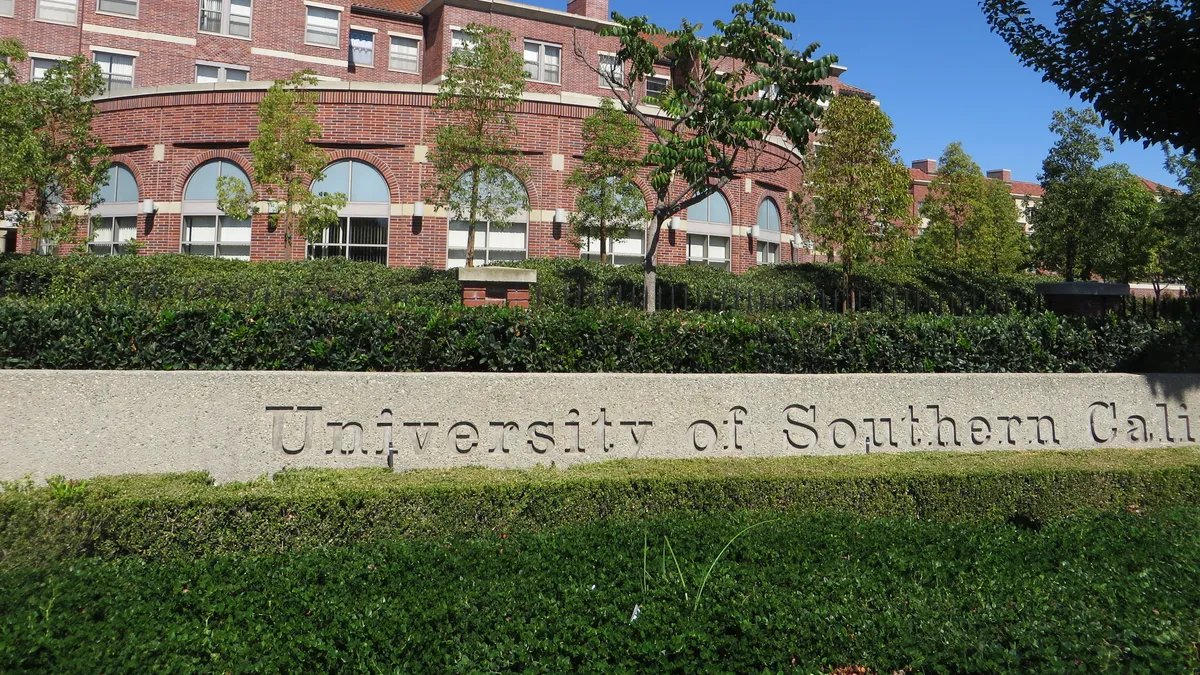Dive Brief:
- About 60% of California voters think private colleges' admissions generally favor affluent students, according to a recent poll by Policy Analysis for California Education (PACE), a Stanford University-based research center, and the University of Southern California's Rossier School of Education.
- A smaller share, only 40%, believe admissions at public four-year institutions favor wealthy students. Roughly 2,000 voters were surveyed.
- The data highlights the public's distrust of college admissions, which surveys show persists nearly a year after the Varsity Blues scandal made headlines.
Dive Insight:
The results from the latest poll reflect scores of surveys that suggest public opinion of the fairness of college admissions remains low since the Varsity Blues controversy was made public last March. The scandal saw high-profile parents charged, and some since convicted, with paying to secure their children spots at elite institutions, including USC and Yale and Georgetown universities.
Only 20% of U.S. adults who responded to a Rasmussen poll conducted in the days after the news of Varsity Blues broke believe admissions standards at elite institutions are "generally" fair and honest. And 69% of respondents said the scandal was part of a larger pattern of corruption in admissions.
The public has even railed against common legal admissions practices.
A poll conducted last year by Suffolk University, in Boston, and USA Today found that a majority of Americans do not agree with giving special treatment to athletic recruits, students who claim minority status, or those whose relatives are graduates of an institution or have donated large sums of money to it.
Since last year, California voters seemed to have soured on certain admissions advantages, the new PACE/USC Rossier poll suggests. About 51% of voters polled oppose giving preference to "elite" athletes. This is a slight uptick from last year's survey, in which 47% of respondents opposed such advantages.
The architects of the poll note that they slightly adjusted the wording of admissions-related questions, though they were "broadly similar" from the prior year.
Voters also disagree with giving children of alumni preferential admission. Just over half (55%) opposed it this year, an 11 percentage point jump from 2019.
And 65% of voters are against admissions preferences for children of donors, versus 54% who said the same last year.
Morgan Polikoff, an associate professor of education at USC who helps run the poll, said that while it's difficult to attribute the changes to particular events, the fact that opinion remained relatively the same on admissions preferences for disadvantaged students suggests Varsity Blues is still on the public's mind.
About 71% of voters last year — and 68% of respondents this year — supported giving students from rural or underserved areas preference in admissions.
With research findings continuing to reinforce American's skepticism of admissions, policymakers across the political spectrum have some reason to interfere with colleges' processes, Polikoff told Education Dive in an interview. Democrats are often concerned with matters of equity, and Republicans generally have "anti-college sentiment," he said.
State legislators have put forth proposals in the aftermath of Varsity Blues that attempt to address areas of admissions that were exploited. California passed three admissions-related laws last fall, The Associated Press reported. One of the measures requires at least three senior administrators to approve an exception in admissions.
On the federal front, Sen. Ron Wyden (D-Ore.) introduced legislation in June that would would require colleges to create policies prohibiting them from considering family members' donations or their ability to donate when evaluating applicants. Among other provisions, it would also force colleges to report "the number of applicants, admitted students and enrolled students who are the children of donors," which the U.S. Department of Education would make public.









